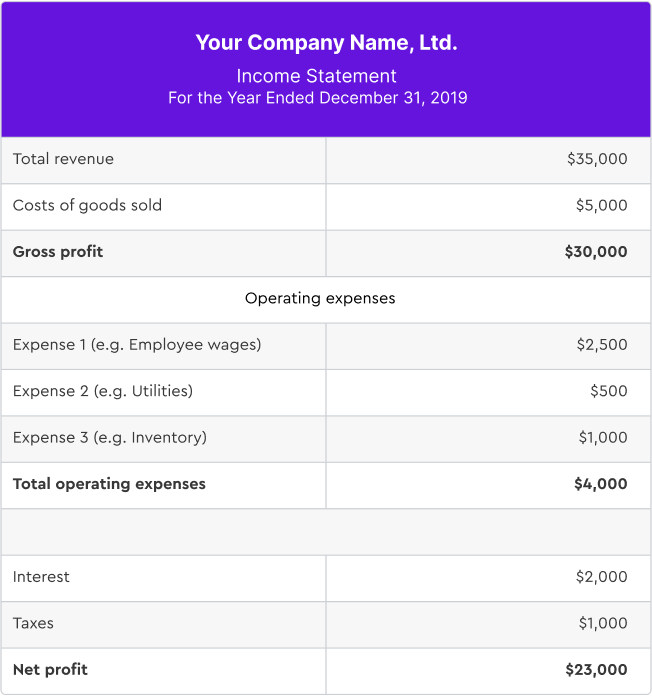
Gross Profit vs Net Profit: What Are the Differences & How to Calculate
Profit – it’s a pretty basic concept, right?
More money means higher profits, which means your business is better off. Truthfully, it’s not quite that simple.
Get the full scoop on gross profit vs net profit with this guide.
Gross profit vs net profit
Before we get into the difference between gross profit and net profit, let’s first define what a profit margin is in more general terms.
What is profit margin?
Your business’s profit margin is a percentage value of how much your business earns for every dollar made in sales. The more money your business earns for every sale made, the higher your profit margin becomes.
Gross profit vs net profit, on the other hand, are more specific (and different) measurements that are used to determine your business’s financial health. Let’s dig into the difference between gross profit and net profit.
What is gross profit?
Gross profit is how much money your business earns (revenue) minus only the cost of goods sold (COGS). But it should go without saying that there are many other expenses besides your COGS that your business must cover in order to keep running. So, gross profit is the measurement of profit before taking into account all expenses. In a nutshell, that’s the key difference between gross and net profit.
What is net profit?
Net profit is how much money your business earns minus all expenses, including taxes, operating expenses, loan repayments, COGS, and so on. Before you can calculate your business’s net profits, you’ll need to first measure your business’s gross profit. If you do the math and your ‘net profit’ is a negative value, it would correctly be referred to as ‘net loss’.
Important note: Net profit shouldn’t be confused with net operating income, which is one of the factors considered when calculating your debt service coverage ratio.
Given these definitions, your business’s gross profit can be sky-high, but if you have lots of expenses to pay every month then your net profit could be much lower (or even negative).

Why you need to know the difference between gross and net profit
When your business’s finances are measured and assessed, it could turn out that there’s a big difference between gross profit and net profit.
Maybe you’re making a ton of sales and earning lots of money per sale (high gross profit), which would look great to investors or lenders. But, if they take a closer look at all of your business expenses and see that your net profit is unimpressive, you’ll likely be seen as a less stable or less reliable business.
However the numbers come out, and whether you’re looking for additional funding through alternative business financing or traditional bank loans, the loan provider will want to see how much money you’ll realistically have available to make repayments on time and in full.
But lenders or investors aren’t the only ones who will care about your business’s gross profit vs net profit. You should also stay aware of the difference between gross and net profit so that you can manage your business responsibly!
How knowing the difference between gross profit and net profit helps:
- Use gross profit to help you develop the right pricing strategy for your business
- Use both gross and net profit measurements to make broader plans to improve your business profits
- Use net profit to determine how much you can set aside for a business disaster recovery plan
- Use both gross and net profit measurements to help you beat the small business failure rate
- Use both gross and net profit measurements to keep you prepared for the Tax Day deadline
- Use net profit to see if you have enough money to scale up your business
- Etc.
Regardless of which industry your business is in, there are tons of useful and important insights that you’ll gain by learning the difference between gross and net profit.
Important note: The type of business you run won’t make a difference when it comes to gross profit vs net profit – but it will come into play when considering the industry loans that will be best for your company.
Fortunately, the Become online business lending marketplace has dozens of top lenders that offer funding solutions for countless industries.
How to calculate gross vs. net profit
Now that you know what gross and net profit are, and the differences between the two, it’s time to learn the equations so you can calculate them.
They’re very simple formulas, so there’s no need to be worried if you’re not the best with numbers!
Gross profit formula

Net profit formula

How to present gross vs net profit in an income statement
It’s true that when you calculate profits, there will be a difference between gross and net values. Despite the differences, these two types of profit measurements are going to be presented alongside one another in your income statement.
Starting at the top of the income statement, you’ll record dollar amounts in the following order:
- Total revenue
- Costs of goods sold
- Gross profit
- Operating expenses
- Expense 1 (e.g. Employee wages)
- Expense 2 (e.g. Utilities)
- Expense 3 (e.g. Inventory)
- Etc.
- Total operating expenses
- Interest
- Taxes
- Net profit
Of course, the number and types of expenses that are listed will differ from one company to the next. Do you have employees to pay? Do you have a separate rent for a work location? Is there existing debt from business loans taken out in the past?
Whatever your business’s expenses are, just be sure to include all of them so that your gross and net profit are measured accurately.
The basic layout of your income statement should look something like this:

Bottom line
In plain words, gross profit is the measurement of your business’s revenue minus costs of goods sold – net profit is the measurement of your business’s revenue minus all expenses (including COGS and others). The difference between gross and net might is a crucial piece of knowledge to have in mind as you run your small business.
But even when considering the differences, the phrase ‘gross profit vs net profit’ is actually better understood in terms of cooperation as opposed to a challenge of some sort. You can’t measure your net profit without your gross profit, and your gross profit sheds only a small bit of light on your business’s true financial health.
Gross vs net profit? There’s no competition – you’ll need to measure both in order to keep your small business on top of its finances!




